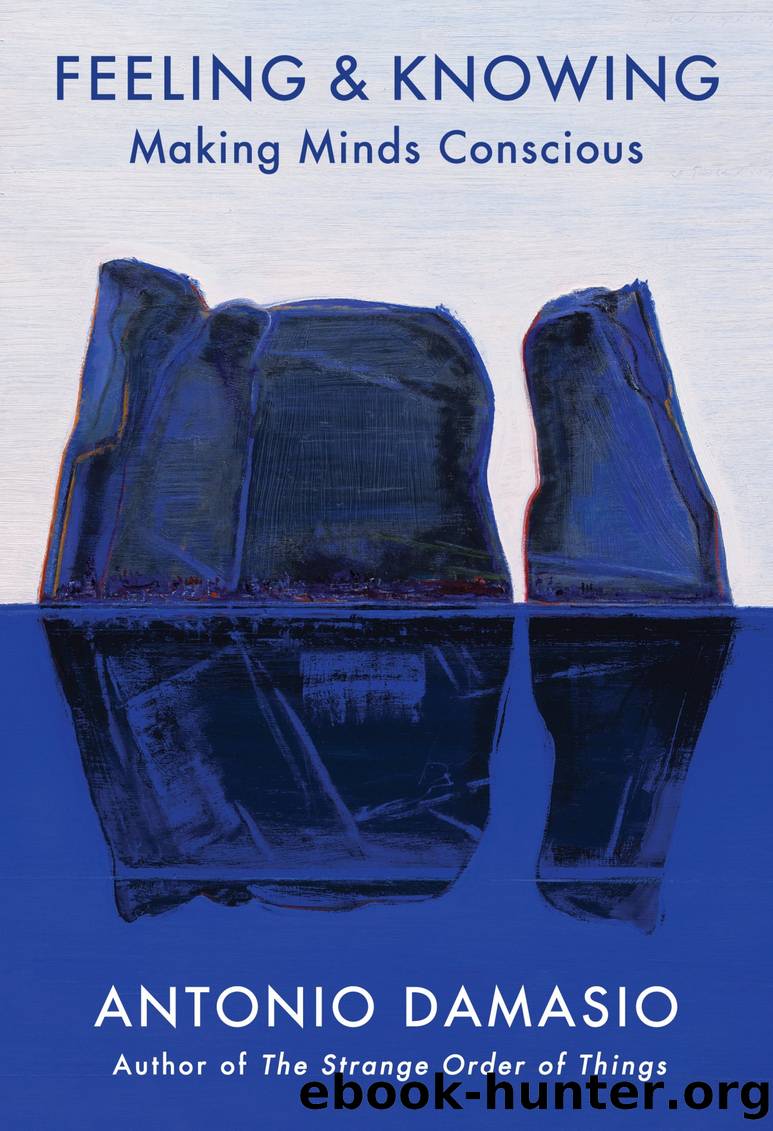Feeling & Knowing by Antonio Damasio

Author:Antonio Damasio [Damasio, Antonio]
Language: eng
Format: epub
Publisher: Knopf Doubleday Publishing Group
Published: 2021-10-26T00:00:00+00:00
NATURAL CONSCIOUSNESS
Unannounced and unaccompanied by a proper definition, the word âconsciousnessâ has acquired multiple meanings and become a bit of a linguistic nightmare. This young English word did not even exist in the time of Shakespeare and has no direct counterpart in Romance languages; in French, Italian, Portuguese, and Spanish, one has to make do with the equivalent of âconscienceâ and use context to clarify which meaning of âconscienceâ the speaker is after.1
Some of the varied meanings of consciousness relate to the optics of the observer/user. Philosophers, psychologists, biologists, or sociologists look at consciousness distinctly. So do ordinary people who hear, night and day, that certain problems are or fail to be âin their consciousnessâ and who must wonder if consciousness is the erudite label for being awake or attentive or simply having a mind. Yet quietly, hiding under its cultural baggage, there is an essential meaning of the word âconsciousness,â one that contemporary neuroscientists, biologists, psychologists, or philosophers can recognize, even though they approach the phenomenon with varied methods and explain it in different ways. For all of them, more often than not, âconsciousnessâ is a synonym of mental experience. And what is a mental experience? It is a state of mind imbued with two striking and related features: the mental contents it displays are felt, and those mental contents adopt one singular perspective. Further analysis reveals that the singular perspective is that of the particular organism within which the mind inheres. Readers who detect a kinship between the notions of âorganism perspective,â âself,â and âsubjectâ will not be wrong. Nor will they be wrong when they realize that âself,â âsubject,â and âorganism perspectiveâ correspond to something quite tangible: the reality of âownership.â The âorganism owns its particular mindâ; the mind belongs to its particular organism. Weâme, you, whoever is the conscious entityâown an organism animated by a conscious mind.
To make these considerations as transparent as possible, we need to be clear about the meaning of a few terms: mind, perspective, and feeling. Mind, as defined earlier, is one way of referring to the active production and display of images arising from actual perception or from memory recall or from both. The images that constitute a mind flow in a never-ending cortege and, as they do so, describe all sorts of actors and objects, all sorts of actions and relationships, all sorts of qualities without and with symbolic translations. Images, of every kindâvisual, auditory, tactile, verbal, and so forthâindividually or in combination, are natural vehicles of knowledge, they transport knowledge, they explicitly signify knowledge.
Perspective refers to âpoint of view,â provided there is no doubt that when I use the word view I do not mean vision only. The consciousness of blind people also has a perspective, but it has nothing to do with seeing. By point of view I mean something more general: the relation I hold not just to what I see but also to what I hear or touch and, importantly, even to what I perceive in my own body.
Download
This site does not store any files on its server. We only index and link to content provided by other sites. Please contact the content providers to delete copyright contents if any and email us, we'll remove relevant links or contents immediately.
The Art of Thinking Clearly by Rolf Dobelli(8836)
Mindhunter: Inside the FBI's Elite Serial Crime Unit by John E. Douglas & Mark Olshaker(7830)
Change Your Questions, Change Your Life by Marilee Adams(6637)
Nudge - Improving Decisions about Health, Wealth, and Happiness by Thaler Sunstein(6629)
Mastermind: How to Think Like Sherlock Holmes by Maria Konnikova(6227)
The Power of Now: A Guide to Spiritual Enlightenment by Eckhart Tolle(4749)
Men In Love by Nancy Friday(4315)
Factfulness: Ten Reasons We're Wrong About the World – and Why Things Are Better Than You Think by Hans Rosling(4016)
The Confidence Code by Katty Kay(3561)
Thinking in Bets by Annie Duke(3528)
Man and His Symbols by Carl Gustav Jung(3310)
Three Women by Lisa Taddeo(2916)
The Worm at the Core by Sheldon Solomon(2910)
Why Buddhism is True by Robert Wright(2821)
Liar's Poker by Michael Lewis(2806)
The Inner Life of Animals by Peter Wohlleben(2763)
Descartes' Error by Antonio Damasio(2728)
The Power of Mindful Learning by Ellen J. Langer(2706)
The Slow Fix: Solve Problems, Work Smarter, and Live Better In a World Addicted to Speed by Carl Honore(2570)
